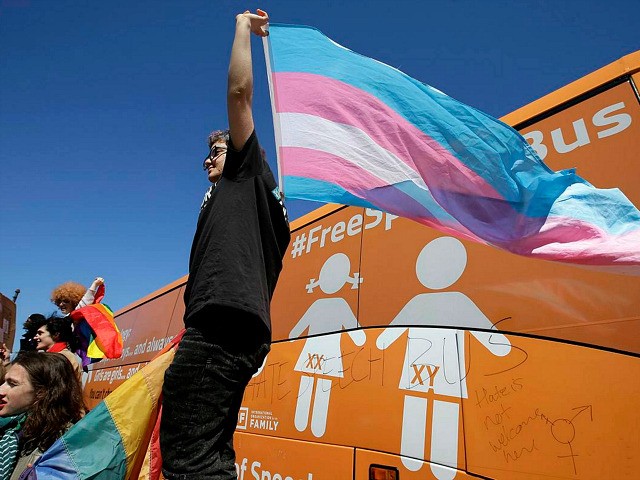A new law proposed by the far-left party in Spain’s coalition government will make it easier for residents to change genders for official purposes. A bill sponsored by Equality Minister Irene Montero aims to make gender self-determination — no diagnosis, medical treatment or judge required — the norm, with eligibility starting at age 16. Nearly 20 countries, eight of them in the European Union, already have similar laws.
Factions of the Catholic Church and the right have focused their opposition to the bill on the fact that it also would allow children under 16 to bypass parental objections and seek a judge’s assistance in accessing treatment for gender dysphoria, the medical term for the psychological distress that results from a conflict between an individual’s identity and birth-assigned sex.
Less expected has been the fierce resistance from some feminists and from within Spain’s Socialist-led government.
“I’m fundamentally worried by the idea that if gender can be chosen with no more than one’s will or desire, that could put at risk the identity criteria for 47 million Spaniards,” Deputy Prime Minister Carmen Calvo, a veteran Socialist and women’s rights advocate, said last week.
Opponents argue that allowing people to choose their gender eventually would lead to “erasing” women from the public sphere: if more Spaniards registered male at birth switch to female, they say, it would skew national statistics and create more competition for women for everything from jobs to sports trophies.
A transgender weightlifter has swept the women’s categories in the 2019 Pacific Games in Samoa, winning two gold medals over natural-born female opponents. https://t.co/SfRxKoo84U
— Breitbart News (@BreitbartNews) July 16, 2019
The divide in Spain mirrors a debate between a branch of feminist theorists and LGBTQ rights movements around the globe. At one end, activists often derogatorily referred to as TERFs (trans-exclusionary radical feminists) posit that accepting transgender orthodoxy uncritically could undercut efforts to root out sexism and misogyny by negating the existence of biological sexes.
The State Federation of Lesbian, Gay, Transgender and Bisexual people says that if passed in its current form, the law would help end discrimination against transgender people and leapfrog Spain to the European vanguard of advancing LGBTQ political causes.
Montero’s bill nonetheless has provoked unusual fury on online platforms, where critics express alarm over provisions that would assign public toilets and prisons according to “registered gender.” Confluencia Feminista, an alliance of dozens of women’s rights organizations, also has come out against any changes to Spain’s existing law.
Former Prisons Minister Reveals Trans Inmates Have Raped Female Staff https://t.co/bhhwypOwzY
— Breitbart London (@BreitbartLondon) April 14, 2020
The concern of Alexandra Paniagua, one of the new platform’s activists, pivots around the idea that by eliminating the opinions of doctors and judges, state-subsidized hormones and gender reassignment surgery would become more available, ultimately “promoting” more dysphoria among young people.
“More people will see easier access to the invasive treatment, especially girls who have been told that their bodies are less worthy in our society,” she said.
But Trans Platform Federation President Mar Cambrollé argues that some of the fears cited as reasons to keep existing hurdles in place are based on outdated ideas that reduce boys and girls, men and women to a handful of socially prescribed characteristics and roles.
“Transphobic attitudes piss me off,” Cambrollé said. “As a woman, I’ve been discriminated against for being a woman in a world made by men for men, but also by cis[gender] people who build it with other cis people in mind.”
No Prison for Trans 'Woman' Who Attacked Underage Girls in Public Toilets https://t.co/ijHakEPan9
— Breitbart London (@BreitbartLondon) February 17, 2019
Finding a compromise any time soon looks like an insurmountable task judging by the virulence of the debate online. Cambrollé has sued 85-year-old Lidia Falcón, the founder of Spain’s Feminist Party, for repeatedly saying that transgender and gay people promote paedophilia; prosecutors are investigating Falcón’s statements as a possible hate crime.
Ángela Rodríguez, an advisor to Montero on LGBTQ issues, said the bill’s timing has added to the tension, with International Women’s Day coming up on March 8.
“There is a dispute for the hegemony of the message in the feminist movement,” Rodríguez said during a recent panel discussion.
Scottish Hate Crime Bill to Criminalise Misgendering Trans People https://t.co/kEW81WZzuu
— Breitbart London (@BreitbartLondon) November 26, 2020
The Associated Press and AP reporters Emilio Morenatti and Renata Brito contributed to this report.

COMMENTS
Please let us know if you're having issues with commenting.